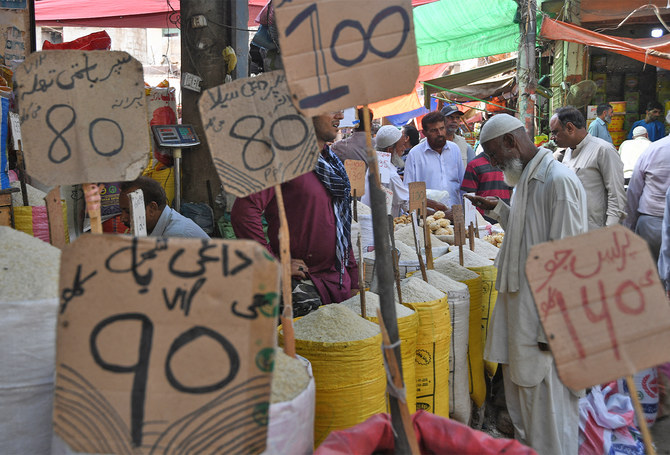KARACHI: Pakistan's central bank on Friday hiked its key policy rate by 150 basis points to 8.75%, citing risks related to surging inflation and the balance of payments.
Pakistan's current account deficit has swollen to $1.66 billion in October from $1.13 billion in September due to a moderate decline in exports, remittance inflows and some uptick in service imports.
Increased energy prices have kept the import bill high despite a downtick in non-energy imports, according to State Bank of Pakistan (SBP) data released ahead of the monetary policy statement. The current deficit for FY22 is expected to exceed previous forecasts of 2-3 percent of gross domestic product.
“The Monetary Policy Committee (MPC) decided to raise the policy rate by 150 basis points to 8.75 percent,” SBP said. “This reflected the MPC’s view that since the last meeting, risks related to inflation and the balance of payments have increased while the outlook for growth has continued to improve."
As the Monetary Policy Committee meeting was previously scheduled for Nov. 26, the central bank said it took place earlier "in light of recent unforeseen developments that have affected the outlook for inflation and the balance of payments, and to help reduce the uncertainty about monetary settings prevailing in the market."
The SBP said inflationary pressures have increased considerably with headline inflation rising from 8.4% (yoy) in August to 9% in September and further to 9.2% in October, mainly driven by higher energy costs and a rise in core inflation.
"With respect to the balance of payments, the current account deficits in September and October have been larger than anticipated, reflecting both rising oil and commodity prices and buoyant domestic demand," the central bank said. "The burden of adjusting to these external pressures has largely fallen on the rupee."
The decisions come as the South Asian nation is in negotiations with the International Monetary Fund (IMF) over a $6 billion loan program.
"Falling foreign exchange reserves, higher current account deficit, inflationary pressure and obviously pending IMF deal could be possible reasons of policy rate hike," Muhammad Sohail, chief executive of Topline Securities, told Arab News.
Khurram Schehzad, chief executive of Alpha Beta Core, a financial advisory platform, said "seems so," when asked whether the hike was related to the country's stalled IMF funding facility talks.
The central bank on Friday also decided to increase the number of annual monetary policy committee meetings from six to eight.
"Massive rate hike in a go, and MPS now going to take place eight times a year than six times earlier," Schehzad said. "What happened to 'gradual' and measured response to markets for a direction, as SBP mentioned earlier in its policy statements?"
The rise of the benchmark interest rate to one and half year high exceeded market expectations.
“Higher than expected rise,” Sohail said, adding the central bank's decision to also raise Cash Reserve Requirement (CRR) by 1% for banks was a surprise move
Most of respondents of a Topline Securities survey expected a rise of between 75 bps and 100bps.




















